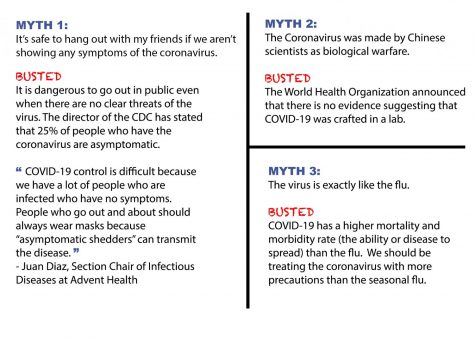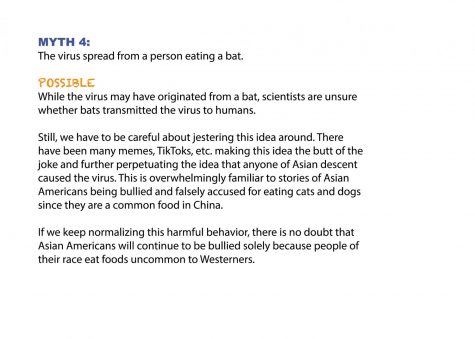Ever since the coronavirus was first reported in the United States, hundreds of Asian Americans have shared stories of falling victim to racist and xenophobic attacks, whether it be being spat on or beaten up. In fact, according to the Asian Pacific Policy & Planning Council, over 1,100 incidents of racist attacks were reported from March 19, 2020 to April 3, 2020 alone. While this number continues to surge, business at Chinese-owned restaurants in New York have dropped by 60 percent according to the New York Post and some restaurants have even been permanently shut down. While bustling Chinatowns in large cities like New York City have seen a decrease in customers, Orlando doesn’t fall far from the pattern.
The Orlando Sentinel reported that Chinese restaurants were suffering up to 3 times more revenue loss than other competing establishments. While white restaurant owners had a reported 15-20% loss, several Chinese restaurant owners stated a 30-50% drop. But why are these numbers only apparent for the Asian minority? Competing businesses with white owners have not been sinking like Chinese ones, yet the United States has almost 1.3 million more COVID-19 cases than China.
This data exposes another problem, along with the pandemic, that we must face: the undeniable racism toward Asian Americans when people impulsively find a new scapegoat to blame.
While these stories are heartbreaking, they are hardly startling; America has a long history of associating viruses with minority groups. Ever since the 19th century, Americans have wrongly correlated multiple disease outbreaks to new influxes of Asian immigrants. Millions justified their discrimination against Asian Americans saying that they carried smallpox and cholera––commonly named “Asiatic Cholera.” However, smallpox originally came to America from Europe, and cholera was just as prominent in European countries as it was in Asian countries. The 1882 Exclusion Act even outlined that denied entrance for Asian immigrants was based on their threat of carrying illnesses.
The Asian footprint in America has forever been marked with labels of deadly diseases, and it still continues today––even in our own White House.
On March 16th, President Donald J. Trump first publicly addressed the virus as the “Chinese virus” in a tweet to his 79.7 million Twitter followers, a label that would be repeated in his briefings and social media accounts.
Thousands gave him pushback for the mishandling of the name. The World Health Organization even announced a statement advising against using the phrase. But when reporters asked why he kept using that label, he always came back to the same argument: “It came from China.”
“On the surface you would definitely think that there isn’t any racist connotation with it because it is labeling a geographic region,” World History teacher Isiah Cabal said. “But you can kind of interpret it in [Trump’s] tone… in his body language. In an article, it seems innocuous. But when you hear him say it in a press conference… It definitely stirs that phobia.”
Sure, the virus did come from China. But when you place that label in the context of all the panic that is ensuing in the world, people are going to associate that ethnicity with the fear and distress they are facing. Americans are then inclined to use Asian Americans as the scapegoat for “causing” the virus.
Not only does this fuel more hatred toward Asian Americans, but it also firmly seeds America’s xenophobia that will only grow in years to come if we continue to use this label. Using “Chinese” as a geographic adjective is much more than a simple descriptive word when it incites painful hate crimes and distresses Asian Americans.
Cabal, a first generation Fillipino, claims that his mother has been given uncomfortable “looks” in public when grocery shopping. Junior Maggie Yuan also fears that people will think she has the virus solely based on her race since she saw her mother being recently singled out and questioned on whether she had a fever or had been coughing.
While these instances are not as extreme as ones in New York City or San Francisco, it still stirs a destructive uneasiness among the Asian public. Nowadays, everyone has to worry about their health and safety, but Asian Americans must also live in fear that they could be the next victim of a racist attack––just like Yuan’s family.
“My grandma is scared that people will pull up to her house and deport her because she is Chinese,” Yuan said.
During a COVID-19 briefing on March 26, an interviewer asked President Trump, “What are the concrete measures you are taking to combat the hate crimes against Asians?”. He responded: “Well I don’t know. All I know is this, Asian Americans are… doing fantastically well. I’m very close to them as you know… I think they appreciate the job we are doing… to me, Asian Americans are a great part of our country.”
Actions speak louder than words. So far, there hasn’t been any strong legal steps with notable effects that have combated racism against Asian Americans. In fact, new data proves quite the opposite; it has been reported that there are 100 new racist attacks per day according to Judy Chu, a U.S. Representative from California. Although Trump did stop using the phrase, he continues to ignore the ongoing criticism Asians are suffering–– criticism that was partly provoked from his use of the phrase.
We need to stop living in this “us” vs. “them” mentality. This isn’t a war. This isn’t a country versus another country, a race pitted against another race. This is a chance for us to support each other while we push through this pandemic, and perpetuating bigotry toward minority groups is not going to help us beat the virus.
“America needs to realize that anybody can get the virus and that it is not an Asian thing,” Yuan said. “We all have the same bodies with the same features, and we should all work together to eradicate the disease rather than trying to blame someone for it.”









